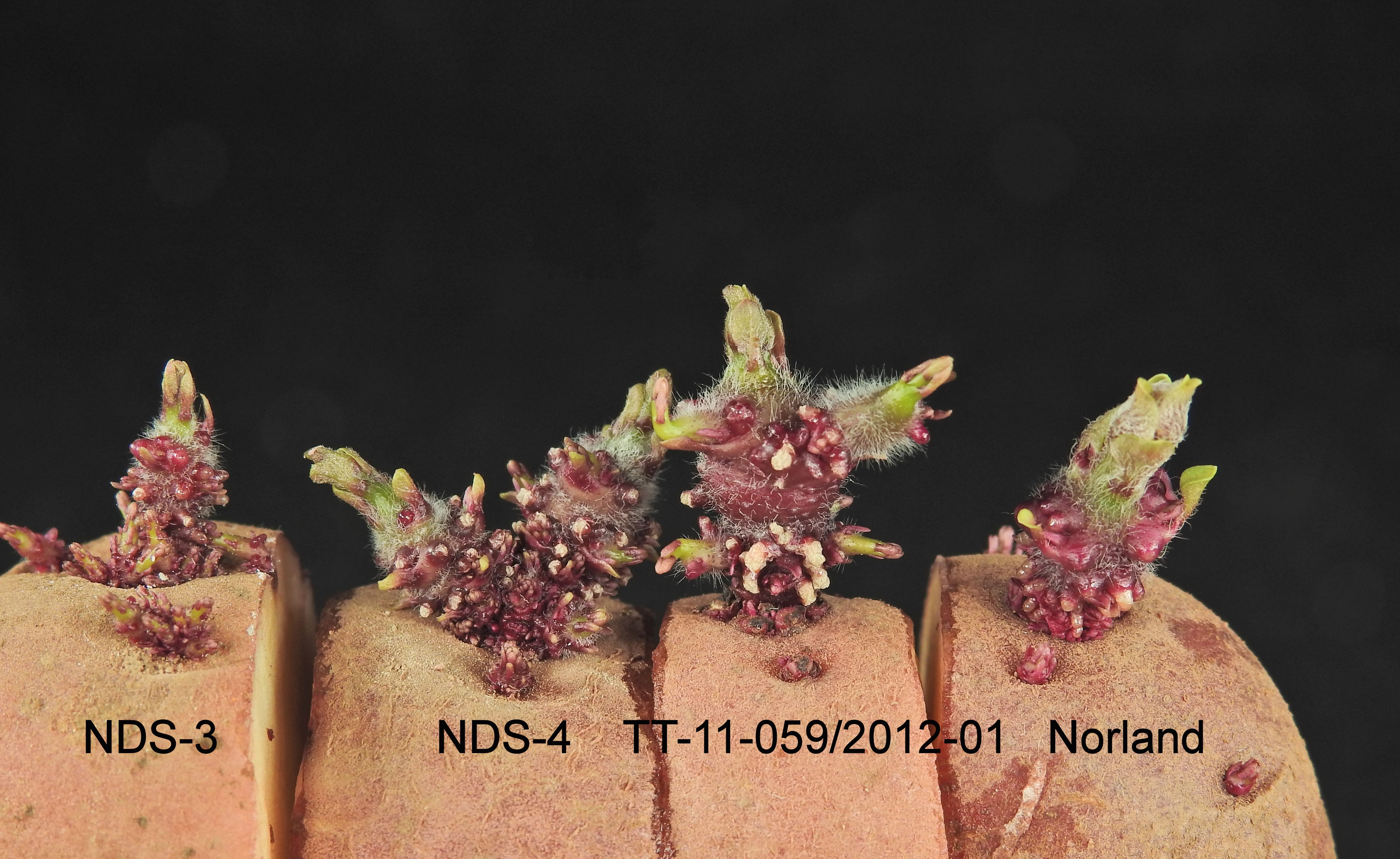Peony
| Denomination: | 'Peony' |
|---|---|
| Previously Proposed Denomination: | 'NDS-3' |
| Botanical Name: | Solanum tuberosum |
| Applicant/Holder: |
Tuberosum Technologies Inc. P.O.Box 35 Broderick, Saskatchewan S0H 0L0 Canada |
| Breeder: |
Tuberosum Technologies Inc., Broderick, Saskatchewan |
| Application Date: | 2021-03-22 |
| Provisional Protection:: | 2021-03-22 |
| Application Number: | 21-10447 |
Variety Description
Varieties used for comparison: 'Petunia' and 'Norland'
Summary: The lightsprout of 'Peony' is medium sized whereas that of 'Norland' is large. The upper side of the leaf of 'Peony' is medium green while those of the reference varieties are dark green. The midrib on the upper side of the leaf of 'Peony' has a high extent of anthocyanin colouration while those of 'Petunia' have a very high extent of anthocyanin colouration. The terminal and lateral leaflets of 'Peony' have a medium frequency of coalescence while those of 'Petunia' have an absent or very low to low frequency of coalescence and those of 'Norland' have an absent or very low frequency of coalescence. The leaflet of 'Peony' has deep veins while those of 'Petunia' and 'Norland' have veins of a medium depth. The leaflet blade at the apical rosette of 'Peony' has pubescence while pubescence is absent on those of the reference varieties. The plants of 'Peony' are shorter than those of 'Petunia' and 'Norland'. The plants of 'Peony' have a low to medium frequency of flowers while the plants of 'Norland' have an absent or very low frequency of flowers. The tuber of 'Peony' is round while it is round to short oval for 'Petunia' and short oval for 'Norland'.
Description:
LIGHTSPROUT: medium sized, ovoid, many root tips, short lateral shoots
LIGHTSPROUT BASE: strong intensity of anthocyanin colouration, absent or low to medium proportion of blue in anthocyanin colouration, medium density of pubescence
LIGHTSPROUT TIP: small in relation to base, closed habit, medium intensity of anthocyanin colouration, sparse to medium dense pubescence
PLANT: foliage structure is intermediate type, where foliage is half open and stems are partly visible, semi-upright growth habit, matures mid-season
STEM: low to medium extent of anthocyanin colouration along entire stem
LEAF: small to medium sized outline, open, weak presence of secondary leaflets, medium green upper side, high extent of anthocyanin colouration on upper side of midrib, medium intensity of anthocyanin colouration on upper side of midrib, medium frequency of coalescence of terminal and lateral leaflets
SECOND PAIR OF LATERAL LEAFLETS: medium sized, leaflet is narrower than long
LEAFLET: absent or very weak to weak degree of waviness of margin, deep veins, medium glossiness of upper side, pubescence at apical rosette present
PEDUNCLE: low extent of anthocyanin colouration
INFLORESCENCE: low to medium frequency per plant, small to medium sized
FLOWER BUD: high extent of anthocyanin colouration
COROLLA: medium to large
COROLLA (INNER SIDE): strong intensity of anthocyanin colouration, absent or low proportion of blue in anthocyanin colouration, very high extent of anthocyanin colouration
TUBER: round, white flesh
TUBER EYE: medium depth, red at base
TUBER SKIN: red
Origin & Breeding History: 'Peony' (experimental designation ND/S-3) originated from a self-pollination of the variety 'Nordonna' conducted at the Tuberosum Technologies Inc. breeding station in Edmonton, Alberta in 2003. Seeds from the cross were collected in 2003 and planted in a field in Edmonton, Alberta in the spring of 2004. The new variety was selected from this field in 2004 based on its agronomic characteristics and resistance to various diseases.
Tests & Trials: The comparative trial for 'Peony' was conducted by Global Agri Services Inc. in Central Blissville, New Brunswick during the 2022 growing season. The field trial consisted of a single, 22 metre long row per variety. Each row contained 70 plants spaced 0.3 metres apart with inter-row spacing of 1.1 metres. Measurements were taken from 10 plants, or 10 parts of plants, of each variety. The mean difference was significant at the 5% probability level based on a paired Student's t-test. Lightsprout characteristics were assessed on 10 tubers harvested from the comparative trial and observed approximately 2.5 to 3 months after sprouting was promoted by exposing the tubers to an external agent.
Comparison table for 'Peony' with reference varieties 'Petunia' and 'Norland'
Plant height (cm)
| 'Peony' | 'Petunia' | 'Norland' | |
|---|---|---|---|
| mean | 29.1 | 42.4 | 42.2 |
| std. deviation | 4.2 | 3.7 | 2.9 |
Click on image for larger view

Potato: 'Peony' (left) with reference varieties 'Petunia' (center left) and 'Norland' (right)
- Date modified: